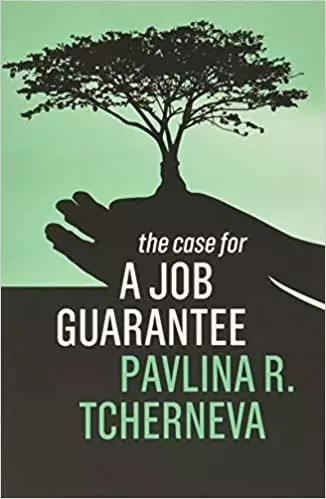The Case for a Job Guarantee
Pavlina Tcherneva
"The Case for a Job Guarantee", Pavlina Tcherneva
An unconvincing argument for a job guarantee
Pavlina Tcherneva proposes a job guarantee program in the US which would employ 11m people at a $15/hour standard wage in green care and conservation sector jobs. The US minimum wage is thereby automatically doubled to $15/hour. The program is deliberately countercyclical so that the job goes when the economy rebounds (p19,49). Her proposal creates economic growth valued at millions of dollars of ‘extra goods and services a day’ (p39), which sounds more like a further consumption boom than a green economy. She quickly but too superficially dismisses Keynesian fiscal policies as ineffective (p40). Unemployment correlates with a wide range of social deprivation (p34), but Tcherneva does not prove the link to be causal, meaning that employment would not necessarily vanquish all the ills she cites. She is morally right in claiming that unemployment should not be used as a bulwark against inflation (p40).
Her proposal is voluntary (p82), but not inclusive as she claims, since it makes no provision for any who choose not to take up an offer of $15/hour work in care or conservation, which does leave the scheme open to the accusation of workfare. ‘The private sector does not create jobs that fit the needs and skills of jobseekers’ (p84), but this is even more true of her proposed Job Guarantee which only suits people seeking such jobs. Arguments against the Job Guarantee are dismissed as ‘the politics of fear’ (p113)!
Tcherneva’s scheme is no guarantee either of employment, or of committed care and conservation programs. It offers only precarious employment which is withdrawn when the economy grows. It does not offer work relative to a person’s professional qualifications, regular remuneration, domestic location, and lifetime aspiration. Whilst correctly arguing for the importance of care and conservation programs, she is content to let these cease when the economic upturn arrives. A range of firms and institutions would be needed to employ 11m people to deliver care and conservation services – are these also all to perish in the upturn?
Tcherneva implicitly refers to a visionary age of full high wage employment as core to society and to human ontology, dignity, and welfare. But contrary to her brief assertions (p107), technology and automation are radically altering the nature of work, as they did in previous agricultural and industrial revolutions. Data shows that aggregate wage has been reducing as a proportion of consumer expenditure throughout the whole post-war period. High technology economies structurally require an increasing element of unearned income. A fully automated economy requires no work; an increasingly automated economy requires less work. Work and wage no longer deliver adequate income, viz declining real wages, in-work poverty and ‘bullshit’ jobs. Work decline is inevitable. The only solution is not guaranteeing work, but guaranteeing income through a Universal Basic Income funded by debt-free sovereign money, a variant of MMT.
The book is available here.
Geoff Crocker
Editor ‘The Case for Universal Basic Income’
www.ubi.org

